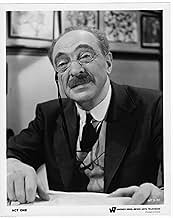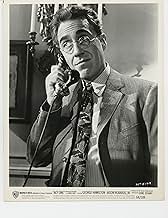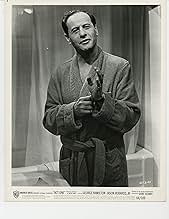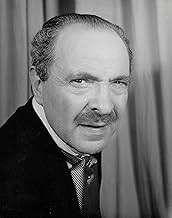Story of the life of writer/playwright Moss Hart.Story of the life of writer/playwright Moss Hart.Story of the life of writer/playwright Moss Hart.
Jonathan Goldsmith
- Teddy Manson
- (as Jonathan Lippe)
- Director
- Writers
- All cast & crew
- Production, box office & more at IMDbPro
Featured reviews
I am an actress and the book "Act One" is one of my favorites and a must-read for every actor, director, producer, etc. I know. The kind of book I re-read every 5 years or so. This movie was a disgrace. Although it had some good actors in it: Jason Robards, Jack Klugman, George Segal. Just awful and a slap in the face to the great Moss Hart. Bert Convy as "Archie Leach", a.k.a. Cary Grant and no English accent? What was that? Also, Moss Hart's family lived in grinding poverty and that was not shown accurately. The apartment they lived in looked much too nice. One of the many horrible things about it was the score! Intrusive, inappropriate, childish. Shame on you, Skitch Henderson!
It's 1929. Moss Hart (George Hamilton) is a young struggling playwright in Brooklyn. He writes five serious plays but there is no taker. Joe Hyman (Jack Klugman) is his best friend and tireless supporter. He teaches a class where he befriends student Lester Sweyd (George Segal). Eventually, he comes up with a comedy about the transition into movie talkies. It attracts director George S. Kaufman (Jason Robards).
George Hamilton has a deliberate speaking style which gives the performance lesser intensity. He should be a desperate man but I only sense that in a couple of scenes. He's the opposite of the emotional acting of James Dean. There is a sense of staleness to the movie. The guys are doing some kind of Algonquin Round Table without the witty banter and sharp takedowns. It's an autobiography of Moss Hart but it could take some liberties if only to inject some drama into this dull production.
George Hamilton has a deliberate speaking style which gives the performance lesser intensity. He should be a desperate man but I only sense that in a couple of scenes. He's the opposite of the emotional acting of James Dean. There is a sense of staleness to the movie. The guys are doing some kind of Algonquin Round Table without the witty banter and sharp takedowns. It's an autobiography of Moss Hart but it could take some liberties if only to inject some drama into this dull production.
Moss Hart wrote one of the great books on theater, Act One, and here it's turned into a film starring George Hamilton as Hart. The film also features Jason Robards as George S. Kaufman, Eli Wallach as a producer, George Segal as Hart's friend Lester, Sam Groom as a student, Ruth Ford as Mrs. Kaufman, Jack Klugman as a good friend to Moss, and Bert Convy as "Archie Leach," another friend, whom film fans know became Cary Grant.
The story goes from Hart's days as a young, serious playwright to the Broadway opening of Hart's first play, "Once in a Lifetime," co-written with George S. Kaufman. They became one of the finest Broadway writing teamsin theater history.
George Hamilton is a handsome man who has become a wonderful parody of himself and his tan in later years. He was never really much of an actor though he does an okay job here. Someone certainly thought a lot of his looks here - he is photographed in closeup with a special light in his eyes, the kind designed for Dirk Bogarde in the '50s.
I don't know if Dore Schary, the director, had a limited budget or what, but casting Bert Convy as Cary Grant was such an insult to probably the biggest male film star of all time. Convy was nice looking, but he made no attempt at an accent. The problem is, it was too small a part to cast someone like John Gavin. The rest of the performances were fine, but Jason Robards as Kaufman was a true standout. Wallach didn't have much to do.
The film has been criticized for being too sentimental. I didn't find it sentimental, I found it unexciting, when there's probably nothing more exciting than preparing a show for Broadway. It's possible that the book wasn't really adaptable as a movie. It's hard to make writing exciting on screen. Hart was a huge talent who wrote some fabulous plays. I just don't think that somehow, his story made for an impressive film.
The story goes from Hart's days as a young, serious playwright to the Broadway opening of Hart's first play, "Once in a Lifetime," co-written with George S. Kaufman. They became one of the finest Broadway writing teamsin theater history.
George Hamilton is a handsome man who has become a wonderful parody of himself and his tan in later years. He was never really much of an actor though he does an okay job here. Someone certainly thought a lot of his looks here - he is photographed in closeup with a special light in his eyes, the kind designed for Dirk Bogarde in the '50s.
I don't know if Dore Schary, the director, had a limited budget or what, but casting Bert Convy as Cary Grant was such an insult to probably the biggest male film star of all time. Convy was nice looking, but he made no attempt at an accent. The problem is, it was too small a part to cast someone like John Gavin. The rest of the performances were fine, but Jason Robards as Kaufman was a true standout. Wallach didn't have much to do.
The film has been criticized for being too sentimental. I didn't find it sentimental, I found it unexciting, when there's probably nothing more exciting than preparing a show for Broadway. It's possible that the book wasn't really adaptable as a movie. It's hard to make writing exciting on screen. Hart was a huge talent who wrote some fabulous plays. I just don't think that somehow, his story made for an impressive film.
Although I recognized the name Moss Hart, I had to do some quick research to learn exactly why it rang a bell. I've never read the source material, so I can't comment on any correlation between the film and book. This review is based solely on my take on the movie in and of itself.
It pains me to write that this film is like drinking a glass of tepid water. It will keep you hydrated, but the impact on the taste buds is negligible. Just when I wanted to rate it a 5.1, something would bump it back to a 4.9. But then this is typical of a Schary project that never seems to rise above.
Hamilton does his best with what he has to work with. Robards isn't given much of a meaty role, but he delivers. I enjoyed Klugman's performance the most. Sylvia Straus, as Hamilton's mother, does a fine job, too.
What I like best about the film is that it does give a glimpse into just how hard it is to achieve major success in the entertainment industry, as told from the point of view of someone already making a semi-living in the business. The tales about an artist being plucked from obscurity and becoming an overnight, wildly successful sensation are fun but don't truly represent reality. Many, many people work for years and years and never witness the accolades due them, regardless of occupation.
This movie shows what happens if you don't give up. Unfortunately, it does so in an unforgettable, bland, and slightly boring fashion. Don't expect too much from it.
It pains me to write that this film is like drinking a glass of tepid water. It will keep you hydrated, but the impact on the taste buds is negligible. Just when I wanted to rate it a 5.1, something would bump it back to a 4.9. But then this is typical of a Schary project that never seems to rise above.
Hamilton does his best with what he has to work with. Robards isn't given much of a meaty role, but he delivers. I enjoyed Klugman's performance the most. Sylvia Straus, as Hamilton's mother, does a fine job, too.
What I like best about the film is that it does give a glimpse into just how hard it is to achieve major success in the entertainment industry, as told from the point of view of someone already making a semi-living in the business. The tales about an artist being plucked from obscurity and becoming an overnight, wildly successful sensation are fun but don't truly represent reality. Many, many people work for years and years and never witness the accolades due them, regardless of occupation.
This movie shows what happens if you don't give up. Unfortunately, it does so in an unforgettable, bland, and slightly boring fashion. Don't expect too much from it.
Four years before his death in 1961 Moss Hart wrote his incredibly successful autobiography Act One where he detailed the story of his life as the son of a cigar maker until the opening night of his first Broadway success, Once In A Lifetime. The film skips all of his childhood and early adulthood and concentrates on the creation of that first success and the process that went into it.
With Dore Schary producing and directing the film for Warner Brothers it certainly could be said that this was someone who knew the creative process and could empathize with Moss struggling to write that first success, accepting the help of George S. Kaufman who had already achieved success on Broadway as a collaborator with such folks as Morrie Ryskind and Edna Ferber and Marc Connelly. Two heads are often better than one when it's right two heads.
As this was written way before Stonewall, the gay side of Moss Hart was certainly not explored. Moss Hart married Kitty Carlisle and they did have two children, but Moss was forever a man on the prowl as any number of Broadway folks could have attested to back in the day. Young George Hamilton may not have looked Jewish, but he certainly gave off some attractive vibes.
With his hair styled as a straight up flat top and a pair of glasses, Jason Robards, Jr. was the spitting image of George S. Kaufman who probably put more wit into the mouths of actors than anyone else in the last century, not to mention some of the offhanded cracks he was credited with. Ruth Ford played a sympathetic first wife who was soon to be an injured innocent party when Kaufman got dragged into Mary Astor's divorce case via her diary. According to her Kaufman had more than wit available in his arsenal.
Eli Wallach puts in an appearance as a producer who was supposed to be based on Jed Harris who was one of the most disliked men on Broadway, the spiritual father of David Merrick later on. He doesn't get much to work with so it's not one of his better portrayals.
You also had to love that delicatessen round-table that included such folks as Jack Klugman, George Segal, and Bert Convy playing a young actor named Archie Leach. As Cary Grant said in His Girl Friday, no one ever heard from him again. Sort of a warm up for Hart of the famous Algonquin round-table where he and Kaufman were charter members.
Moss Hart probably came along at one of the peak times for creativity in the American theater and he became a very big part of it. He also got over his distaste for musicals being associated with quite a few good ones in his time, the last being Camelot. Maybe had he lived we might have seen an Act Two. But his whole life was one big creative process.
With Dore Schary producing and directing the film for Warner Brothers it certainly could be said that this was someone who knew the creative process and could empathize with Moss struggling to write that first success, accepting the help of George S. Kaufman who had already achieved success on Broadway as a collaborator with such folks as Morrie Ryskind and Edna Ferber and Marc Connelly. Two heads are often better than one when it's right two heads.
As this was written way before Stonewall, the gay side of Moss Hart was certainly not explored. Moss Hart married Kitty Carlisle and they did have two children, but Moss was forever a man on the prowl as any number of Broadway folks could have attested to back in the day. Young George Hamilton may not have looked Jewish, but he certainly gave off some attractive vibes.
With his hair styled as a straight up flat top and a pair of glasses, Jason Robards, Jr. was the spitting image of George S. Kaufman who probably put more wit into the mouths of actors than anyone else in the last century, not to mention some of the offhanded cracks he was credited with. Ruth Ford played a sympathetic first wife who was soon to be an injured innocent party when Kaufman got dragged into Mary Astor's divorce case via her diary. According to her Kaufman had more than wit available in his arsenal.
Eli Wallach puts in an appearance as a producer who was supposed to be based on Jed Harris who was one of the most disliked men on Broadway, the spiritual father of David Merrick later on. He doesn't get much to work with so it's not one of his better portrayals.
You also had to love that delicatessen round-table that included such folks as Jack Klugman, George Segal, and Bert Convy playing a young actor named Archie Leach. As Cary Grant said in His Girl Friday, no one ever heard from him again. Sort of a warm up for Hart of the famous Algonquin round-table where he and Kaufman were charter members.
Moss Hart probably came along at one of the peak times for creativity in the American theater and he became a very big part of it. He also got over his distaste for musicals being associated with quite a few good ones in his time, the last being Camelot. Maybe had he lived we might have seen an Act Two. But his whole life was one big creative process.
Did you know
- TriviaFirst film role of Jonathan Goldsmith (as Jonathan Lippe), who portrayed Teddy Manson, and who is now much better known as "The Most Interesting Man in the World" from Dos Equis beer TV commercials.
- GoofsIn an early scene, Moss Hart (George Hamilton) hears a radio news broadcast reporting that Colonel Theodore Roosevelt has just returned from an Asian excursion and that the "former president was in excellent spirits". This refers to an actual news event reported on September 10, 1929, but it was President Roosevelt's son, also named Theodore, who made the trip. The former president had died in 1919.
The radio also reports that the New York Yankees defeated the Detroit Tigers 9-3 the previous day, but the game occurred two days earlier and the previous day's game had been postponed because of rain. The news report is read nearly verbatim from the New York Times' account of the game.
- Crazy credits"Curtain" (instead of "The End")
- ConnectionsReferenced in I've Got a Secret: George Hamilton (1963)
Details
- Runtime
- 1h 50m(110 min)
- Color
- Aspect ratio
- 1.66 : 1
Contribute to this page
Suggest an edit or add missing content
































